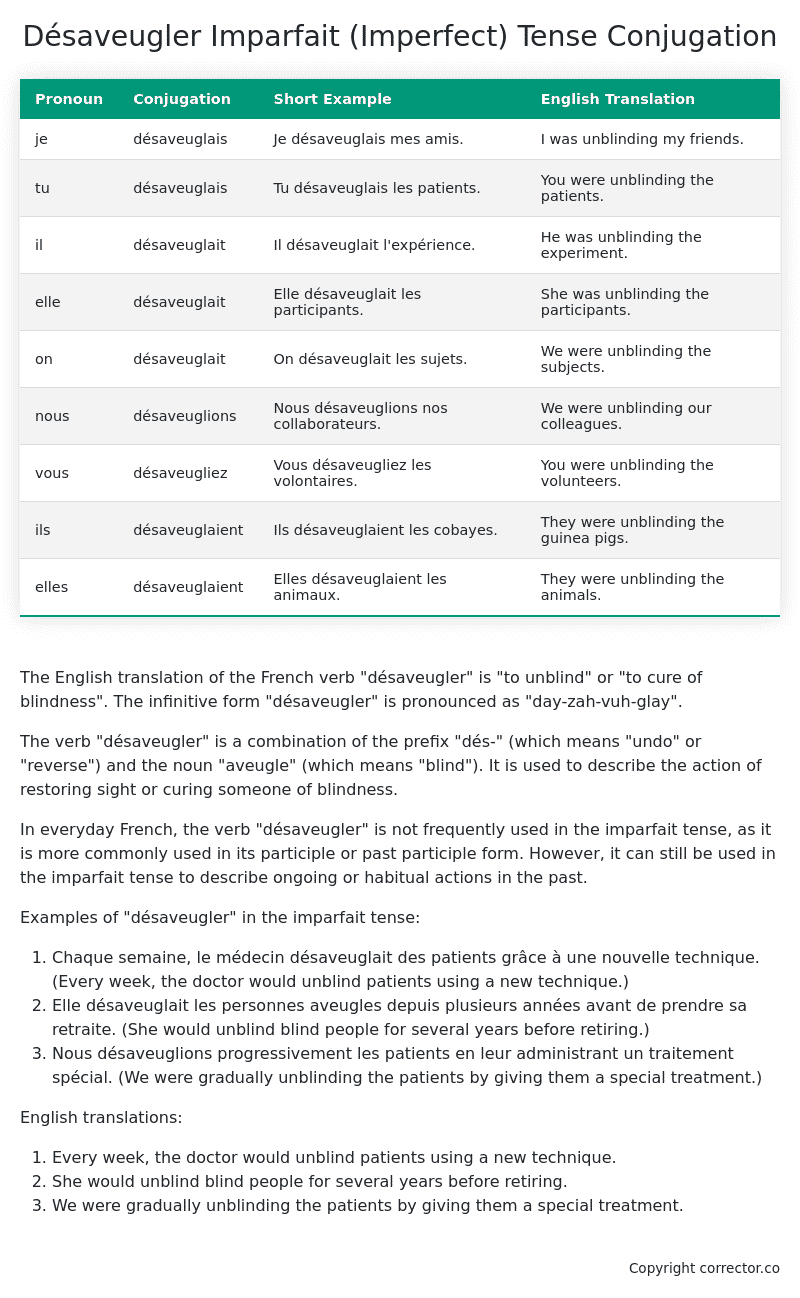Imparfait (Imperfect) Tense Conjugation of the French Verb désaveugler
Introduction to the verb désaveugler
The English translation of the French verb “désaveugler” is “to unblind” or “to cure of blindness”. The infinitive form “désaveugler” is pronounced as “day-zah-vuh-glay”.
The verb “désaveugler” is a combination of the prefix “dés-” (which means “undo” or “reverse”) and the noun “aveugle” (which means “blind”). It is used to describe the action of restoring sight or curing someone of blindness.
In everyday French, the verb “désaveugler” is not frequently used in the imparfait tense, as it is more commonly used in its participle or past participle form. However, it can still be used in the imparfait tense to describe ongoing or habitual actions in the past.
Examples of “désaveugler” in the imparfait tense:
- Chaque semaine, le médecin désaveuglait des patients grâce à une nouvelle technique. (Every week, the doctor would unblind patients using a new technique.)
- Elle désaveuglait les personnes aveugles depuis plusieurs années avant de prendre sa retraite. (She would unblind blind people for several years before retiring.)
- Nous désaveuglions progressivement les patients en leur administrant un traitement spécial. (We were gradually unblinding the patients by giving them a special treatment.)
English translations:
- Every week, the doctor would unblind patients using a new technique.
- She would unblind blind people for several years before retiring.
- We were gradually unblinding the patients by giving them a special treatment.
Table of the Imparfait (Imperfect) Tense Conjugation of désaveugler
| Pronoun | Conjugation | Short Example | English Translation |
|---|---|---|---|
| je | désaveuglais | Je désaveuglais mes amis. | I was unblinding my friends. |
| tu | désaveuglais | Tu désaveuglais les patients. | You were unblinding the patients. |
| il | désaveuglait | Il désaveuglait l’expérience. | He was unblinding the experiment. |
| elle | désaveuglait | Elle désaveuglait les participants. | She was unblinding the participants. |
| on | désaveuglait | On désaveuglait les sujets. | We were unblinding the subjects. |
| nous | désaveuglions | Nous désaveuglions nos collaborateurs. | We were unblinding our colleagues. |
| vous | désaveugliez | Vous désaveugliez les volontaires. | You were unblinding the volunteers. |
| ils | désaveuglaient | Ils désaveuglaient les cobayes. | They were unblinding the guinea pigs. |
| elles | désaveuglaient | Elles désaveuglaient les animaux. | They were unblinding the animals. |
Other Conjugations for Désaveugler.
Le Present (Present Tense) Conjugation of the French Verb désaveugler
Imparfait (Imperfect) Tense Conjugation of the French Verb désaveugler (You’re reading it right now!)
Passé Simple (Simple Past) Tense Conjugation of the French Verb désaveugler
Passé Composé (Present Perfect) Tense Conjugation of the French Verb désaveugler
Futur Simple (Simple Future) Tense Conjugation of the French Verb désaveugler
Futur Proche (Near Future) Tense Conjugation of the French Verb désaveugler
Plus-que-parfait (Pluperfect) Tense Conjugation of the French Verb désaveugler
Passé Antérieur (Past Anterior) Tense Conjugation of the French Verb désaveugler
Futur Antérieur (Future Anterior) Tense Conjugation of the French Verb désaveugler
Subjonctif Présent (Subjunctive Present) Tense Conjugation of the French Verb désaveugler
Subjonctif Passé (Subjunctive Past) Tense Conjugation of the French Verb désaveugler
Subjonctif Imparfait (Subjunctive Imperfect) Tense Conjugation of the French Verb désaveugler
Conditionnel Présent (Conditional Present) Tense Conjugation of the French Verb désaveugler
Conditionnel Passé (Conditional Past) Tense Conjugation of the French Verb désaveugler
Conditionnel Passé II (Conditional Past II) Tense Conjugation of the French Verb désaveugler
L’impératif Présent (Imperative Present) Tense Conjugation of the French Verb désaveugler
L’impératif Passé (Imperative Past) Tense Conjugation of the French Verb désaveugler
L’infinitif Présent (Infinitive Present) Tense Conjugation of the French Verb désaveugler
L’infinitif Passé (Infinitive Past) Tense Conjugation of the French Verb désaveugler
Le Participe Présent (Present Participle) Tense Conjugation of the French Verb désaveugler
Le Participe Passé (Past Participle) Tense Conjugation of the French Verb désaveugler
Struggling with French verbs or the language in general? Why not use our free French Grammar Checker – no registration required!
Get a FREE Download Study Sheet of this Conjugation 🔥
Simply right click the image below, click “save image” and get your free reference for the désaveugler imparfait tense conjugation!

Désaveugler – About the French Imparfait Tense
NOTE: To take a deep dive into all the French tenses then see our article on Mastering French Tense Conjugation.
Formation of the Imparfait Tense
For regular -er verbs:
For regular -ir verbs
For regular -re verbs
Common Everyday Usage Patterns
Description of Past Habits
Background Information
Mental and Emotional States
It’s employed to express emotions, thoughts, or physical sensations in the past. For example: “J’étais content quand il est arrivé.” (I was happy when he arrived.)
Ongoing Actions
Points to Note About the Imparfait Tense
Passé Composé vs. Imparfait
Conditional
Si Clauses
Narration
I hope you enjoyed this article on the verb désaveugler. Still in a learning mood? Check out another TOTALLY random French verb imparfait conjugation!


